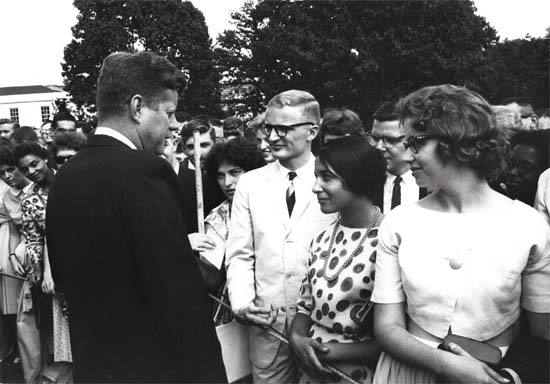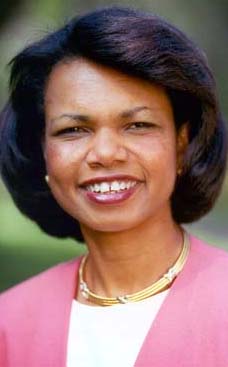1963: Editorial: Talking and writing have spread the "Peace Corps idea" around the world
Peace Corps Online:
History of the Peace Corps:
1963: Editorial: Talking and writing have spread the "Peace Corps idea" around the world
Editorial: Talking and writing have spread the "Peace Corps idea" around the world

"Many Volunteers display an ambivalence toward publicity. They seem to want publicity for their project while eschewing it for themselves. They act something like the woman with whom every newspaper editor is familiar: "I don't want you to mention little old me, but why don't you print something about my school project (or my rummage sale or my church social)?" Many Volunteers cannot make the journalistic jump from the idea that stories about projects must often be told as stories about people and their labors. Part of the Volunteer's attitude is an honest desire for anonymity. One staffer wrote: "The Volunteer is not always the best judge of his own contribution; the very modesty of so many of our Volunteers is proof of their fine human qualities." But part of the altitude springs from the Volunteers' (mostly) youth and from the unaccustomed glare of publicity on them as Volunteers. Not many Americans in their 20s have had the public eye as has Jack Nicklaus or Mickey Mantle."
Editorial: Talking and writing have spread the "Peace Corps idea" around the world
EDITORIAL
Can It Be Better?
With this issue THE PEACE CORPS VOLUNTEER marks its first complete year of publication. Thousands of Volunteers who have gone into service since November, 1962, cannot remember when the newspaper looked any different from the way it does now. In fact, it grew out of a merger of The Volunteer, a brown-ink-on-gray-paper publication which went only to Volunteers and their relative and "The Peace Corps News." (blue on white), which was used for general circulation in the U.S., although it too was sent to Volunteers. Neither publication pleased the Volunteers: those who wrote in to protest were few but word came back from abroad that the Volunteers believed that they were being oversold, that their labors were overmagnified. that their successes were overglorified.
Some Volunteers were acquiring inferiority complexes, reports said, because their accomplishments could not measure up to those of Volunteers whom they read about.
From its start THE PEACE CORPS VOLUNTEER tried to do without loaded words like success, wild.blue-yonder words like challenge, and the whole range of value-judgment adjectives, It shifted the onus of reporting Volunteer activities to volunteers themselves. (Oddly enough, Volunteer writers in describing their activities and their philosophy, leaned heavily on words like success and challenge.)
In time, word came back to Washington that the Volunteers "liked" the new publication. Their reaction to it was probably not so much a matter of "liking it" as of having fewer complaints about it. As before. few Volunteers wrote in about it. Word of their changing attitude came back by word of mouth and by letters from staff people in the host countries. Underlying the changing view. though, was the lingering suspicion that the new VOLUNTEER printed only success stories:
"Are we the only Volunteers who have problems?" complained one Volunteer to a staff man in an Asian country.
No, of course they were not: Volunteers everywhere had problems. They still do. There are the surface complaints:
"Where is my travel money?"
"When will I get the shovel you promised two weeks ago?" "They told us we were going to be given sheets and towels."
And there are the complaints that relate to the job:
"My co-worker would rather sleep than work,"
"My supervisor gives me make-work projects so he won't be embarrassed by my suggestions about improving the job."
"The ministry has reneged on its promise to send supplies."
Beneath Complaint Surface, a Maelstrom
Many of the complaints are valid. All of them may be. But what many Volunteers fail to perceive is that one millimeter underneath their surface complaints is a maelstrom that could wreck their chances to achieve those very purposes they sought to serve when they went abroad. Many problems trace back to the system within which the Volunteer has to work. To paraphrase one observer: if there were no inefficiencies in the host countries, if all Volunteer jobs were perfectly structured, there would be no need for Peace Corps Volunteers.'
It is difficult, therefore, for THE VOLUNTEER to describe in detail the origins of many Volunteer problems. The Peace Corps, after all, is a guest in a country. What is common to the guest's tradition may be offensive to the host's. Drawing a line between acceptable, factual observations and comments that offend the host is one of the Volunteer's largest jobs--and one of THE VOLUNTEER'S, too. Failure to draw this line can at the very least imperil the complaining Volunteer's effectiveness in his job. At the most, it might imperil the Peace Corps' effectiveness in his host country. The Peace Corps' job in host countries is to help.
THE VOLUNTEER has printed a wide range of stories by Volunteers on their achievements and their frustrations; it has also printed a wide range of interesting or contrary opinions of the Peace Corps by "outside" writers. It has done so conscious that it is subject to diplomatic scrutiny und interpretation.
Ambivalence Shown to Publicity
Many Volunteers display an ambivalence toward publicity. They seem to want publicity for their project while eschewing it for themselves. They act something like the woman with whom every newspaper editor is familiar: "I don't want you to mention little old me, but why don't you print something about my school project (or my rummage sale or my church social)?" Many Volunteers cannot make the journalistic jump from the idea that stories about projects must often be told as stories about people and their labors. Part of the Volunteer's attitude is an honest desire for anonymity. One staffer wrote: "The Volunteer is not always the best judge of his own contribution; the very modesty of so many of our Volunteers is proof of their fine human qualities." But part of the altitude springs from the Volunteers' (mostly) youth and from the unaccustomed glare of publicity on them as Volunteers. Not many Americans in their 20s have had the public eye as has Jack Nicklaus or Mickey Mantle.
But the Peace Corps is people. The Peace Corps is being widely written about and talked about because it represents one of the truly challenging ideas of the mid-20th century (its success will have to be judged by history). But it is also written about and talked about because it works. It works despite its frustrations and its problems; it works because of the Volunteers; it works because it is a good idea being implemented by men land women of ability and determination.
Talking and writing have spread the "Peace Corps idea" around the world; a dozen industrialized countries have or are planning: their own versions of the Peace Corps; others are adapting the idea for domestic use.
Talking and writing will also sustain the Peace Corps by carrying its message to the Americans who will one day replace the present Volunteers in the field.
Ideally, a Volunteer should have written this essay-to keep off it the stigma of "The Bureaucrat." Almost any Volunteer could have reached the same conclusion about his working position 'if he had been forced to scrutinize it from a really detached point of view. But Volunteers seem to confine their philosophy to bull sessions. Few write in about it.
The columns of THE VOLUNTEER have never been closed to any rational discussion of any topic concerning the Peace Corps. They are not now. Let us hear from you.
This editorial first appeared in the November, 1963 issue of the "Peace Corps Volunteer."
When this story was posted in March 2006, this was on the front page of PCOL:





Peace Corps Online The Independent News Forum serving Returned Peace Corps Volunteers
 | Peace Corps suspends program in Bangladesh
Peace Corps Director Gaddi H. Vasquez announced the suspension of the Peace Corps program in Bangladesh on March 15. The safety and security of volunteers is the number one priority of the Peace Corps. Therefore, all Peace Corps volunteers serving in Bangladesh have safely left the country. More than 280 Peace Corps volunteers have served in Bangladesh since the program opened in November 1998. Latest: What other newspapers say. |
 | The Peace Corps Library
The Peace Corps Library is now available online with over 40,000 index entries in 500 categories. Looking for a Returned Volunteer? Check our RPCV Directory. New: Sign up to receive PCOL Magazine, our free Monthly Magazine by email. Like to keep up with Peace Corps news as it happens? Sign up to recieve a daily summary of Peace Corps stories from around the world. |
 | Invitee re-assigned after inflammatory remarks
The Peace Corps has pulled the invitation to Derek Volkart to join the Morocco Training Program and offered him a position in the Pacific instead after officials read an article in which he stated that his decision to join the Peace Corps was in "response to our current fascist government." RPCV Lew Nash says that "If Derek Volkart spoke his mind as freely in Morocco about the Moroccan monarchy it could cause major problems for himself and other Peace Corps volunteers." Latest: The Ashland Daily Tidings has issued a request for all Peace Corps communications on the case. |
 | Re-envision Peace Corps
Nicholas J. Slabbert says in his article in the Harvard International Review that an imaginatively reinvented Peace Corps could powerfully promote US interests in a period when perceptions of American motives are increasingly relevant to global realignment. His study envisions a new role for the Peace Corps in five linked areas: (1) reinventing America's international profile via a new use of soft power; (2) moving from a war-defined, non-technological, reactive theory of peace to a theory of peace as a normal, proactive component of technologically advanced democracy; (3) reappraising Peace Corps as a national strategic asset whose value remains largely untapped; (4) Peace Corps as a model for the technological reinvention of government agencies for the 21st century; (5) redefining civil society as information technology society. Read the article and leave your comments. |
 | March 1, 1961: Keeping Kennedy's Promise
On March 1, 1961, President John F. Kennedy issues Executive Order #10924, establishing the Peace Corps as a new agency: "Life in the Peace Corps will not be easy. There will be no salary and allowances will be at a level sufficient only to maintain health and meet basic needs. Men and women will be expected to work and live alongside the nationals of the country in which they are stationed--doing the same work, eating the same food, talking the same language. But if the life will not be easy, it will be rich and satisfying. For every young American who participates in the Peace Corps--who works in a foreign land--will know that he or she is sharing in the great common task of bringing to man that decent way of life which is the foundation of freedom and a condition of peace. " |
 | Paid Vacations in the Third World?
Retired diplomat Peter Rice has written a letter to the Wall Street Journal stating that Peace Corps "is really just a U.S. government program for paid vacations in the Third World." Director Vasquez has responded that "the small stipend volunteers receive during their two years of service is more than returned in the understanding fostered in communities throughout the world and here at home." What do RPCVs think? |
 | RPCV admits to abuse while in Peace Corps
Timothy Ronald Obert has pleaded guilty to sexually abusing a minor in Costa Rica while serving there as a Peace Corps volunteer. "The Peace Corps has a zero tolerance policy for misconduct that violates the law or standards of conduct established by the Peace Corps," said Peace Corps Director Gaddi H. Vasquez. Could inadequate screening have been partly to blame? Mr. Obert's resume, which he had submitted to the Peace Corps in support of his application to become a Peace Corps Volunteer, showed that he had repeatedly sought and obtained positions working with underprivileged children. Read what RPCVs have to say about this case. |
 | Why blurring the lines puts PCVs in danger
When the National Call to Service legislation was amended to include Peace Corps in December of 2002, this country had not yet invaded Iraq and was not in prolonged military engagement in the Middle East, as it is now. Read the story of how one volunteer spent three years in captivity from 1976 to 1980 as the hostage of a insurrection group in Colombia in Joanne Marie Roll's op-ed on why this legislation may put soldier/PCVs in the same kind of danger. Latest: Read the ongoing dialog on the subject. |
 | Friends of the Peace Corps 170,000 strong
170,000 is a very special number for the RPCV community - it's the number of Volunteers who have served in the Peace Corps since 1961. It's also a number that is very special to us because March is the first month since our founding in January, 2001 that our readership has exceeded 170,000. And while we know that not everyone who comes to this site is an RPCV, they are all "Friends of the Peace Corps." Thanks everybody for making PCOL your source of news for the Returned Volunteer community. |
Read the stories and leave your comments.

Some postings on Peace Corps Online are provided to the individual members of this group without permission of the copyright owner for the non-profit purposes of criticism, comment, education, scholarship, and research under the "Fair Use" provisions of U.S. Government copyright laws and they may not be distributed further without permission of the copyright owner. Peace Corps Online does not vouch for the accuracy of the content of the postings, which is the sole responsibility of the copyright holder.
Story Source: Peace Corps Volunteer
This story has been posted in the following forums: : Headlines; PCV Magazine; Speaking Out; Journalism
PCOL32119
74
Peace Corps history is like doing geneology! A clue here, a paper there and link or a line of investigation all of which may or may not illuminate what really happened. I love this editorial in the Volunteer. As a serving Volunteer at this time, I, of course, never saw this or most copies of the Volunteer.
In historical context, this may have been the last publication before the Kennedy Assassination. Peace Corps was a little more that two years old and the first Peace Corps groups had come home. The previous summer of 1963 had seen an explosion in Peace Corps training and deployment. The face-to-face contact, the personal "write a letter to Sarge" if you had problem and the "let's go out to Hickory Farm and toss these ideas around" had already passed into Peace Corps mythology, phased out by sheer growth.
The editorial speaks to all kinds of struggles to communicate now with a larger peace corps contingent. How to provide field support? What is evaluation? How to get accurate feedback and still be respectful of host country officials. How to "supervise" Volunteers in the field who were quickly becoming more knowledgeable than those who were hired to manage them? All of these happy sounds were silenced by the day in Dallas. How the Kennedy Assassination changed the Peace Corps is a historical record still to be discovered.
When my two years were drawing to a close, I wrote a letter to Betty Hutchinson, my Project Director; ( who arrived in country four months after my training group did, who visited my site once and who I saw on two other occasions,) and explained in great detail how inadequate our health education training had been and stressed that I was assigned to work with women who counted their families, first by the children living and then by those who were dead and who begged us, daily, to help them keep the children they had living, alive. Our training and the resources we could access did not begin to meet the need and I felt that the clinically trained volunteers should be placed in such position, por lo menos.(at the very least.) Betty replied, using the exact phrases from that editorial, explaining to me that I was not the best judge of my contribution and I just didn't realize all the good I had done.
What I learned decades later, was yet another "piece of the puzzle" and that was in the archives of the South West Research Center at the University of New Mexico. Those archives have training documents and correspondence from the Center for Community Action and the Peace Corps Training Center and reveal that staff was tremendously worried about the lack of effective training that my group and others had received and it was Betty Hutchinson whose letters were the most demanding of improved training. poco a poco (little by little)
Thanks so much to Hugh Pickens and Peace Corps On Line for providing such important links in the history of the Peace Corps.

















